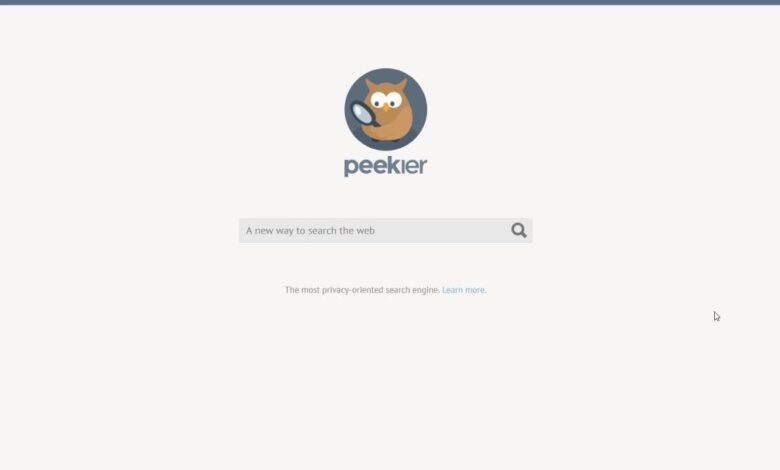
Alternative Search Engines to Google for Data Privacy
Alternative search engines to Google for achieving data privacy: It’s a topic that’s become increasingly relevant in today’s digital world. We’re constantly bombarded with information about data breaches and the vast amounts of personal information collected by tech giants. Google, while undeniably convenient, is also known for its extensive data collection practices. This post explores viable alternatives that prioritize your privacy, offering a look at their features, strengths, weaknesses, and how they differ from Google’s approach to data handling.
We’ll dive into the specifics of what data Google collects and how it’s used, then contrast that with the privacy-focused approaches of other search engines. We’ll compare their search results, user interfaces, and even delve into the ethical considerations and transparency levels of each. Ultimately, the goal is to empower you with the knowledge to make informed choices about which search engine best protects your online privacy.
Introduction to Privacy Concerns with Google Search
Google Search, while incredibly convenient and powerful, operates on a vast data collection infrastructure that raises significant privacy concerns for its users. Understanding the extent of this data collection and how it’s utilized is crucial for making informed choices about online privacy. This section will delve into the specifics of Google’s data collection practices and their implications.Google’s data collection practices are multifaceted and deeply integrated into its search engine and other services.
The company collects data from various sources, including your search queries, browsing history (even when you’re not using Google Search directly), location data, and interactions with Google products and services. This information is then used to personalize your search results, target advertising, and improve Google’s services. The scale of this data collection is immense, making it a powerful tool for Google but also a potential threat to individual privacy.
Google’s Data Collection Methods and the Data Collected
Google’s data collection encompasses a wide range of information, all contributing to a comprehensive user profile. This profile is built not only from direct interactions with Google Search, but also from your activities across the web and on other Google services. The data collected includes search queries, websites visited, location data (both precise and approximate), device information (operating system, browser type, etc.), and even your IP address.
Beyond this, Google also collects data related to your interactions with ads, including whether you clicked on an ad or not. This data is not just passively collected; it is actively analyzed and used to create a detailed understanding of user behavior and preferences. For instance, your search history might reveal your interests, health concerns, or even political affiliations, information that many users would prefer to keep private.
Examples of the Impact of Google’s Data Collection on User Privacy
The implications of Google’s extensive data collection are far-reaching. For example, targeted advertising, while personalized, can feel invasive when ads reflecting your private searches or interests appear across different platforms. Another concern stems from the potential for data breaches. A massive leak of Google’s user data could expose highly sensitive personal information, leading to identity theft or other serious consequences.
Furthermore, the potential for Google to use this data for purposes beyond those explicitly stated in its privacy policy is a significant worry for many users. Consider a scenario where your search history, revealing a medical condition, is used to deny you insurance coverage. This illustrates the potential for real-world harm arising from extensive data collection. Finally, the sheer volume and detail of the data collected allows for highly accurate user profiling, which can be used for various purposes, some of which might not be in the user’s best interest.
Exploring Alternative Search Engines
Switching to a privacy-focused search engine is a significant step towards reclaiming control over your online data. While Google’s search dominance is undeniable, its data collection practices have raised concerns among privacy-conscious users. Exploring alternatives offers a chance to prioritize your digital privacy without sacrificing the convenience of online search. This section will delve into several viable options, highlighting their key features and comparing their privacy policies to Google’s.
Alternative Search Engines Prioritizing User Privacy
Choosing a search engine that respects your privacy requires careful consideration. The following table compares five prominent alternatives, focusing on their core privacy features and strengths and weaknesses. Remember that the privacy landscape is constantly evolving, so it’s always wise to check the latest updates on their respective websites.
| Name | Privacy Policy Highlights | Features | Strengths/Weaknesses |
|---|---|---|---|
| DuckDuckGo | Explicitly states it doesn’t track users; doesn’t store personal information or browsing history. | Simple interface, Bangs (shortcuts to other websites), privacy-focused extensions. | Strengths: Strong privacy commitment, user-friendly interface. Weaknesses: Smaller index than Google, potentially fewer results for niche searches. |
| Startpage | Uses Google’s search index but doesn’t track users; anonymizes searches. | Anonymous View (searches without IP logging), customizable settings. | Strengths: Leverages Google’s extensive index while protecting user privacy. Weaknesses: Relies on Google’s index, so results may be similar to Google. |
| Brave Search | Focuses on privacy and uses its own search index; employs differential privacy techniques. | Built-in ad blocker, rewards system for users, integrated with Brave browser. | Strengths: Independent search index, growing rapidly. Weaknesses: Relatively new, index size still smaller than Google’s. |
| SearX | A metasearch engine; distributes searches across multiple search engines, minimizing reliance on any single provider. | Highly customizable, allows selection of preferred search engines, open-source. | Strengths: Enhanced privacy through distributed search, open-source nature allows community scrutiny. Weaknesses: Interface can be less intuitive than other options. |
| Qwant | European-based search engine with a strong emphasis on privacy; doesn’t track users. | Separate search results for images, news, and videos; offers a kids mode. | Strengths: Strong privacy protections, focus on European data regulations. Weaknesses: Smaller index than Google, limited language support. |
Comparison of Privacy Policies
The core difference between Google’s privacy policy and those of the alternative search engines listed above lies in data collection and usage. Google’s business model relies heavily on personalized advertising, requiring extensive data collection on user search history, location, and other personal information. In contrast, the alternative search engines prioritize user privacy by minimizing or eliminating data collection.
They typically don’t track users’ search history, IP addresses, or other identifying information. While some, like Startpage, may utilize other search engines’ indexes, they take measures to anonymize searches and protect user privacy. This fundamental difference in approach highlights the stark contrast between a profit-driven data collection model and a privacy-centric approach.
Data Handling and Encryption Methods
The core difference between Google and alternative search engines often lies in their approach to data handling and encryption. While Google’s vast data collection fuels its personalized services, alternative options prioritize user privacy by employing different data minimization strategies and encryption techniques. Understanding these differences is crucial for making informed choices about your online privacy.Data handling practices vary significantly across search engines.
Google’s business model relies heavily on collecting and analyzing user data to personalize ads and services. This involves tracking search queries, browsing history, location data, and more. In contrast, many privacy-focused search engines collect significantly less data, often anonymizing or aggregating information to prevent individual identification. This approach reduces the risk of personal information being misused or compromised.
Encryption Methods Used by Alternative Search Engines
Several alternative search engines employ various encryption methods to protect user data during transmission and storage. Some utilize HTTPS encryption, a standard protocol that secures communication between the user’s browser and the search engine’s servers. This ensures that search queries and other sensitive information are transmitted in an encrypted form, preventing eavesdropping by third parties. More advanced privacy-focused search engines may also utilize end-to-end encryption, ensuring that only the user and the search engine can access the encrypted data.
This level of security prevents even the search engine provider from accessing the content of user queries. Specific examples of encryption implementation vary across providers and are often detailed in their respective privacy policies. For instance, a search engine might specify the use of TLS 1.3 or AES-256 encryption for data in transit and at rest.
Data Handling Differences Compared to Google
Google’s data handling practices are characterized by extensive data collection and usage for targeted advertising and service personalization. This includes the creation of detailed user profiles based on search history, browsing activity, location data, and other personal information. Alternative search engines, in contrast, often operate on a data minimization principle. They collect only the necessary data to provide the search functionality, minimizing the amount of personal information stored and processed.
Some alternatives might not store IP addresses or search history at all, while others may employ techniques like differential privacy to aggregate data in a way that protects individual user privacy. This significantly reduces the risk of data breaches and the potential for misuse of personal information.
Data Retention Policies: Google vs. Alternatives
Google’s data retention policies are complex and vary depending on the service used. Generally, Google retains user data for extended periods, often indefinitely for some data types. This allows them to build comprehensive user profiles and provide personalized experiences. Many alternative search engines, on the other hand, have shorter data retention policies. Some may delete user data after a specific period (e.g., a few weeks or months), while others may only retain anonymized or aggregated data.
This shorter retention period reduces the potential for long-term data breaches and limits the amount of personal information accessible in case of a security incident. The specific retention policies are typically clearly Artikeld in each search engine’s privacy policy, allowing users to compare and contrast approaches.
Functionality and User Experience Comparison
Switching from Google to an alternative search engine often involves a trade-off. While privacy is significantly enhanced, the functionality and user experience might differ. This section compares several popular alternatives to Google, focusing on search result accuracy, relevance, and the overall user interface.The shift to a privacy-focused search engine usually means adjusting to a different approach to information retrieval.
While Google’s vast index and sophisticated algorithms deliver highly relevant results most of the time, smaller engines might have limitations in terms of comprehensive coverage and speed. Understanding these differences is crucial for making an informed decision.
Search Result Accuracy and Relevance
The accuracy and relevance of search results vary significantly across different search engines. DuckDuckGo, for instance, often prioritizes showing a variety of sources, which can lead to less focused results compared to Google’s highly personalized approach. SearX, being a metasearch engine, aggregates results from multiple sources, potentially leading to a wider range of information but also requiring more careful evaluation.
Startpage, while using Google’s index, anonymizes searches, providing results similar to Google in terms of relevance but without the personalized tracking. This means that while Startpage might offer similar accuracy to Google, the results may lack the personalized tailoring that Google provides. The trade-off, of course, is enhanced privacy.
Worried about Google’s data collection? Exploring alternative search engines like DuckDuckGo or Startpage is a great first step towards better online privacy. But building truly private applications requires more than just a different search engine; it also demands a secure development environment. That’s where understanding the implications of domino app dev, the low-code and pro-code future , becomes crucial.
By choosing the right development approach, you can build applications that prioritize user privacy from the ground up, complementing your choice of a privacy-focused search engine.
User Interface and Overall User Experience, Alternative search engines to google for achieving data privacy
Each search engine boasts a unique user interface. DuckDuckGo offers a clean, minimalist design with a focus on simplicity. SearX presents a more complex interface, reflecting its metasearch nature and the numerous sources it aggregates. Startpage’s interface is quite similar to Google’s, offering a familiar experience for users transitioning from Google. This familiarity, however, might not extend to features like personalized recommendations or a robust suite of integrated Google services.
The simplicity of DuckDuckGo might appeal to some users, while others might find the complexity of SearX overwhelming. The familiarity of Startpage offers a smooth transition but lacks the advanced features of Google.
Pros and Cons of Alternative Search Engines Compared to Google
Let’s summarize the pros and cons of each alternative search engine compared to Google in terms of user experience:
- DuckDuckGo:
- Pros: Simple interface, strong privacy focus, fast search speed.
- Cons: May lack the depth and breadth of Google’s index, fewer advanced features.
- SearX:
- Pros: Aggregates results from many sources, highly customizable.
- Cons: Can be complex to use, results may be less consistent, speed can vary depending on the sources.
- Startpage:
- Pros: Familiar interface, uses Google’s index for comprehensive results, strong privacy protections.
- Cons: Lacks Google’s advanced features, relies on Google’s index (though anonymized).
Advanced Privacy Features and Tools
Beyond the basic privacy improvements offered by alternative search engines, several provide advanced features designed to further protect user data and browsing activity. These tools range from integration with privacy-focused browsers and networks to highly customizable search parameters allowing for granular control over data collection. Understanding and utilizing these features is crucial for maximizing your online privacy.
Many alternative search engines offer more than just a different algorithm; they provide a toolbox for navigating the web with enhanced privacy in mind. This goes beyond simply avoiding Google’s data collection practices; it involves actively shaping your online footprint and controlling how your data is handled.
Tor Integration
Several privacy-focused search engines, such as DuckDuckGo, offer seamless integration with the Tor network. Tor (The Onion Router) is a free and open-source anonymity network that encrypts your internet traffic and routes it through multiple servers, making it extremely difficult to trace your online activity back to you. Using a search engine with Tor integration adds an extra layer of security, obscuring your IP address and making it harder for trackers to monitor your searches.
This is particularly beneficial for users concerned about government surveillance or censorship, or those seeking to protect their anonymity while researching sensitive topics. For example, a journalist investigating a sensitive story could use a Tor-integrated search engine to research their topic without revealing their IP address or search history to potential adversaries.
Custom Search Parameters
Many alternative search engines allow for advanced customization of search parameters, offering users more control over their data. These parameters often include options to exclude specific websites, filter results based on privacy policies, or specify the type of data collected. For example, a user might choose to exclude results from sites known for intrusive tracking practices. This level of granularity allows users to fine-tune their searches to minimize exposure to potentially harmful or privacy-violating websites.
DuckDuckGo’s !bang feature, for instance, allows users to quickly access other websites while maintaining privacy by directing the search through DuckDuckGo, avoiding direct interaction with the target site’s search engine.
Encrypted Search Results
Some search engines, while not as common, offer encrypted search results. This means that the search query and results are encrypted, protecting them from eavesdropping or interception. This is particularly useful on public Wi-Fi networks where your data might be vulnerable. While not all alternative search engines offer this feature, it represents a significant advancement in online privacy, ensuring that even your search results themselves are protected from unwanted access.
The implementation and effectiveness vary between engines, so it’s crucial to research the specifics of any given engine’s encryption methods.
IP Address Masking and Anonymization
Many alternative search engines actively work to mask or anonymize your IP address. This is often done through the use of proxy servers or other techniques that obscure your true location. This prevents websites and advertisers from tracking your location and building detailed profiles based on your geographical data. While complete anonymity is almost impossible to achieve online, reducing the amount of personally identifiable information available significantly enhances your online privacy.
This is especially important for users who are concerned about targeted advertising or location-based tracking.
Ethical Considerations and Transparency
The shift towards alternative search engines is driven not only by a desire for enhanced privacy but also by a growing awareness of the ethical implications of data handling practices. Understanding how different search engines collect, use, and protect user data is crucial for making informed choices aligned with personal values. This section explores the ethical dimensions of various search engines and examines their transparency levels regarding data practices.Exploring the ethical landscape of search engines reveals a complex interplay between user privacy, business models, and societal impact.
While some prioritize user privacy and data minimization, others prioritize data collection for targeted advertising and other revenue streams. This raises questions about the balance between individual rights and corporate interests, and the potential for bias in search results influenced by data-driven algorithms. Transparency in data practices becomes paramount in allowing users to understand and evaluate the ethical implications of their choices.
Data Handling Practices and Ethical Implications
Different search engines employ diverse data handling practices, each with distinct ethical implications. Some, like DuckDuckGo, explicitly state their commitment to not tracking users and employ techniques to minimize data collection. Others, while offering privacy-enhancing features, may still collect some data for improving their services. The ethical implications arise from the potential for misuse of collected data, the lack of informed consent, and the potential for discriminatory algorithms based on biased data sets.
For instance, a search engine that heavily relies on personalized results based on user data might inadvertently perpetuate existing societal biases.
Transparency Levels of Alternative Search Engines
The level of transparency varies significantly among alternative search engines. Some provide detailed privacy policies and readily accessible information about their data collection and usage practices. Others offer less detailed explanations, making it difficult for users to fully understand how their data is handled. This lack of transparency raises concerns about accountability and the potential for hidden data practices that could compromise user privacy.
A high degree of transparency is crucial for building user trust and fostering responsible data handling practices.
Comparison of Search Engine Transparency
| Search Engine | Privacy Policy Detail | Data Collection Transparency | Data Usage Transparency |
|---|---|---|---|
| DuckDuckGo | Highly detailed and easily accessible | Very transparent; clearly states minimal data collection | Very transparent; explains data usage for service improvement |
| Startpage | Detailed privacy policy | Transparent about anonymized search queries | Transparent about data usage for service improvement |
| SearX | Detailed but technically oriented privacy policy | Relatively transparent; uses multiple metasearch engines | Transparent about its decentralized nature and data handling by individual metasearch engines |
| Brave Search | Detailed privacy policy | Transparent about data collection for service improvement | Transparent about data usage, emphasizing user control |
Note: This table reflects a general assessment based on publicly available information. The actual level of transparency may vary and requires individual review of each search engine’s privacy policy.
Illustrative Examples of Privacy Breaches

Understanding the potential privacy risks associated with online search is crucial for making informed choices about which search engine to use. Let’s examine hypothetical scenarios to illustrate the differences in how Google and alternative privacy-focused search engines might handle sensitive information. These examples highlight the importance of choosing a search engine that aligns with your privacy priorities.
The following scenarios demonstrate how seemingly innocuous searches can reveal personal information and how different search engines approach data handling.
Medical Information Searches
Imagine searching for information about a rare medical condition affecting a family member. With Google, your search history, IP address, and potentially even your location could be linked to this sensitive query. This data could be used for targeted advertising, or, worse, potentially be accessed by third parties without your knowledge or consent. An alternative search engine prioritizing privacy, however, would likely anonymize your search, using techniques like encryption and avoiding the collection of personally identifiable information (PII).
Searches Related to Financial Transactions
Let’s consider a scenario where you search for information regarding a specific investment or financial product. Google’s data collection practices could link this search to your other online activities, creating a detailed profile that could be valuable to advertisers or even used for malicious purposes like targeted phishing attacks. A privacy-focused search engine, on the other hand, might only record the search query itself, without connecting it to your identity or other online behavior.
Searches Related to Sensitive Personal Information
Suppose you are researching sensitive topics like political affiliations, religious beliefs, or sexual orientation. Google’s extensive tracking could associate these searches with your identity, potentially leading to unwanted profiling or targeted manipulation. In contrast, a privacy-respecting search engine might not collect any personally identifiable data at all, ensuring that your searches remain completely private.
- Scenario: Searching for information about a specific political candidate. Google: This search could be linked to your identity and used to target political advertising, potentially influencing your views or creating a detailed profile of your political leanings. Alternative Search Engine: The search would be handled anonymously, with no connection to your personal information.
- Scenario: Researching symptoms of a sensitive health condition. Google: This information could be used for targeted advertising of pharmaceuticals or health services, potentially revealing personal health details to third parties. Alternative Search Engine: The search would be encrypted and anonymized, protecting your medical privacy.
- Scenario: Searching for information about a planned trip or upcoming vacation. Google: This could reveal your travel plans to advertisers and potentially expose you to targeted scams or price gouging. Alternative Search Engine: Your search would be processed without revealing your identity or location.
End of Discussion: Alternative Search Engines To Google For Achieving Data Privacy

Choosing a search engine that respects your privacy shouldn’t feel like a compromise on functionality. While Google’s dominance is undeniable, the alternatives discussed here prove that powerful search capabilities and robust privacy protection can coexist. By understanding the differences in data handling, encryption, and transparency, you can take control of your digital footprint and choose a search engine that aligns with your values.
It’s about more than just search results; it’s about protecting your personal information and making conscious choices in the digital age. Start exploring these alternatives today and experience the difference!
Key Questions Answered
What is the difference between Google’s data collection and that of privacy-focused search engines?
Google collects vast amounts of data about your searches, browsing history, and location to personalize ads and services. Privacy-focused search engines collect significantly less data, often anonymizing your searches and not tracking your browsing history.
Are alternative search engines as accurate as Google?
Accuracy varies. While some may not match Google’s comprehensive index, many provide highly relevant results. The accuracy often depends on the specific search query.
Do all alternative search engines offer end-to-end encryption?
Not all do. Check each engine’s privacy policy to determine its encryption methods and data handling practices. End-to-end encryption ensures your search queries are protected from being intercepted.
Can I use alternative search engines on my mobile device?
Yes, most privacy-focused search engines have mobile apps or are accessible through mobile browsers.





